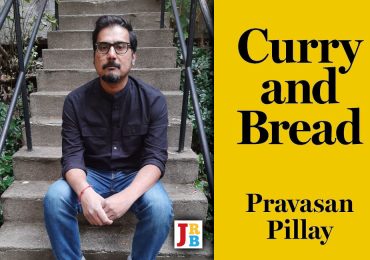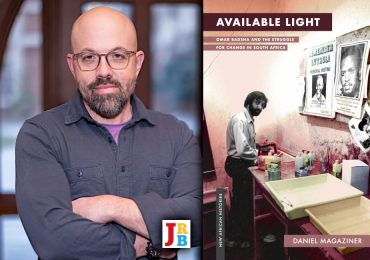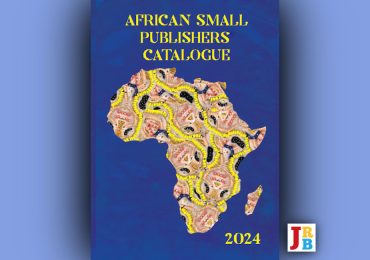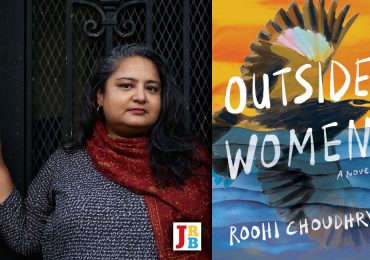Sifiso Mzobe shows his fellow scribe, and JRB City Editor, Niq Mhlongo around his hometown of Durban during the Time of the Writer Festival.
I feel guilty. Niq Mhlongo hawwws been in Durban since the beginning of March, and I haven’t seen him once. We have talked on the phone about meeting in my city since news broke that he was going to curate the Time of the Writer Festival this year, as part of the Andrew Mellon Foundation/University of KwaZulu-Natal ‘Artist in Residency’ programme.
More than anything I feel guilty because I have never actually sat down for more than ten minutes with Niq Mhlongo. This crime can be blamed solely on timing. When I entered the literary scene Niq was trailblazing his way through one European country or other. The only time we had met was a brief encounter between my sessions at the Abantu Book Festival in 2017. I say that it’s a crime that I have never spent time with Niq Mhlongo because he was the writer who inspired me to attempt to publish my novel, Young Blood. A profile of Niq in the Lifestyle magazine of the Sunday Times made me believe that you can be young, come from the township, tell an uncompromising story and get published.
Today is the opening night of the Time of the Writer Festival. I have to make things right. I call Niq. It’s only a few hours before the festival kicks off. He is about to call an Uber to take him to the Elizabeth Sneddon Theatre at UKZN. Forget the Uber, I say. I’m fetching you.
At Berea Centre, Niq buys ‘supplies’ for us to use after the formalities. We sit down for a talk. ‘Don’t disappear from the radar, mpintshi yami,’ he tells me. ‘The literary scene needs your writing.’ I nod. Opening night goes down well. We meet the other festival participants.
Niq and I hit the Durban streets afterwards. He already has a favourite hangout spot—Amsterdam Bar in Glenwood. We settle down, watch Champions League football, beers greasing the conversation. Time flies. We are suddenly hungry. The kitchen has closed. We search for other places in Glenwood but all their kitchens have closed, too. No worries, I say, I know a place.
We take the back routes from Glenwood and zigzag up to Musgrave Road. This drive affords a glistening view of the sprawling city of Durban from high up. We get to Florida Road, and I am lightheaded from hunger as we make our way to Florida Keys. The waitress greets the hungry pleas in our eyes when we ask if the kitchen is still open with a smile. She goes over to a guy at the bar counter. I swear she pleads with him on our behalf. The guy at the counter looks our way for a few seconds. The tiredness engulfing his face somehow disappears. He, too, breaks into a smile and nods. This is Durban.
We order two shisa nyama platters that can feed four, and more beer. We wolf down the meat, watching Liverpool win with a gritty second half performance against Bayern Munich. Chatter rolls on, the place empties. We remember we have morning sessions. We walk up Florida Road through a scant breeze. I wonder why the streets are empty but quickly remember that today is Wednesday, and it is late. Through cigarette smoke, I regale Niq with tales of the city. He is in full wide-eyed amazement as I lay out the dark underbelly of Durban. A drunk fabulist from my hood, Umlazi township, recognises me under the glare of a streetlight, and starts telling a tale that will end with me giving him a ride back to the township. I know that his tales also end with trouble. I’m not going to the township, I lie. Niq and I call it a night.
Day two. It is hot, even for Durban. That heat where the humidity feels like a blanket draped over your body. Niq, the curator of the festival, has thrown me in at the deep end. I’m facilitating a creative writing workshop with high school kids at Inchanga Library, some thirty-odd kilometres outside Durban. I’m a bit nervous because it is the first time I have ever facilitated a workshop or chaired a panel discussion. But I know how much I would have gained had I met a writer in high school. I do my best. The workshop produces a simple story written by the group.
To avoid a repeat of yesterday’s hunger, we eat too much food at Inchanga Library. The shuttle then drops us off at the Maharani Hotel, where festival participants are staying. We have a few hours to kill before the evening sessions in Clermont township. Niq wants to kill these few hours at Amsterdam. But we are right by the beach, so I suggest we go to Circus Circus on the promenade. We need to cool down from the heat of the day, and there might be a breeze. Bhekisisa Mncube, Angela Makholwa, Lerato Mogoatlhe, Dudu Busani-Dube, Niq and I settle in at the cafe and wait for the reluctant breeze over drinks. Our chatter is chilled, mellowed by the heat. The sun disappears but the heat remains. When the breeze finally starts to cool our faces it is time to set off for Clermont for the evening sessions.
At Sizakala Centre Auditorium Hall in Clermont, just as I have a lightbulb moment about something deep to say during the panel discussion, the lights go out. Load shedding is back with a vengeance, but we won’t be vanquished. We carry on with the discussion in the dark. It’s an intimate affair, with portable lights illuminating the corners of the hall. I attend an eye-opening session about how authors, both self-published and those who are published by big publishing houses, struggle for book sales. I get many ideas on how to boost sales, particularly from Dudu Busani-Dube and her guerilla marketing tactics. A lot is covered in this session. Books by South African authors are not publicised enough in South Africa. Most bookshops do not give our books enough space. African, let alone South African, fiction is treated like the unwanted stepchild of the literary world.
After the last discussion we head back to the city. I’m saving the details of the chatter and jokes from the shuttle for my memoirs. It is boiling hot, a beer will do. Niq and I settle for Badgers in Glenwood. We are tired, the heat has done a number on all of us. We call it an early night—it’s only 11.30 p.m.
Day three. Niq is tired, but he soldiers on. Most mornings he has been up early doing interviews to promote the festival. When other participants have their feet up between sessions Niq is busy sorting out one thing or another. Load shedding is punctual again as we start the evening sessions at the Grosvenor Library in Bluff. The sessions are well-attended but it is hot. We keep the panel discussions short. Today we recruit Bhekisisa Mncube, author of The Love Diary of a Zulu Boy, for our night foray in the city.
Amsterdam is our base. Today is Friday, so the place is packed. Niq is truly perplexed that people recognise him in Durban. A few days earlier, he tells us, a young man walked passed him, paused, ran after him and asked if he was Niq Mhlongo. It is because of your work, Niq, and what it means to people, we tell him. Somebody yells—’Tequilas!’ It seems like a good idea at the time.
We are outside Joe Cool’s on the promenade when the rough side of my city shows up. Two street urchins, zombified by a drug called wunga or nyaope, go at each other. One chases the other, promising to disembowel him with a sharpened stick. We stay clear of the fracas, and walk up the steps to the bar. The bouncer closes the glass doors. He taps at the face of his watch, shaking his head at our amazed faces. We pull out our cellphones. It really is 2 a.m.
Day Four. I launch the book series I translated into isiZulu, The Shadow Chasers by Bontle Senne, at KZNSA Gallery. It is the last day of the festival. Authors take photos together and exchange numbers and emails. The elation that glowed in our faces during the festival is beginning to drain away. It’s back to the reality of the everyday grind. The admiration of the audience, the signing of books, all of that has faded away.
It is Saturday. We settle on Badgers in Glenwood for sundowners. First we eat. We reflect on the festival. It was indeed a beautiful festival, I say, slurping spicy beef trinchado. Niq nods while eating his T-bone steak and chips. It was a great festival because the panel discussions were chaired by authors. Aspiring writers got a lot of information from the sessions; the art of writing was laid bare. Niren Tolsi arrives with a photographer to interview Niq. They go across to Amsterdam.
Later, my friend Sihle Mthembu (not the author) joins us. Being township bred Sihle hits it off with Niq straight away. I hear him tell Niq not to change his Soweto-accented isiZulu if he wants to charm Durban girls (among other questionable pieces of advice). A gorgeous woman stops Niq on his way back from the toilet. We are sitting a few tables away from the interaction but I can see the adulation in her eyes. Maybe she is mistaking me for someone she knows, says a confused Niq when he gets back to our table. Hardly a minute passes and the woman is back, standing over our table. Niq stands up to chat to her. ‘I always knew I’d meet you one day, Niq Mhlongo,’ she says. She is plastered to Niq in a handshake/hug combo. She leaves. Niq opens his hand. We all smile because she has left, in Niq’s hand, pungent heads of Grade A marijuana.
Niq wants to see more of Durban nightlife, so we decide to take him to Egagasini nightclub on Gillespie Street near the beach. The interior of Egagasini glows fluorescent blue. The woman to man ratio is three to one. House music thumps relentlessly. The dance floor is a sea of writhing bodies. There is a perpetual smile on Niq’s face. Yet another fan shakes his hand. The lights go out at the height of the night. Load shedding is punctual, again. We file out of the nightclub, the torches of our cell phones lighting the way.
We agree to call it a night but somehow manage spend an hour standing on the pavement. We talk about the city, listening to the waves, watching other night owls walk by. The beach is just metres away. Niq has enjoyed this night most of all. But there’s more in store for him. Next weekend I’m taking him to my hood, Umlazi.
- Sifiso Mzobe is a writer and journalist based in Durban. Follow him on Twitter.





